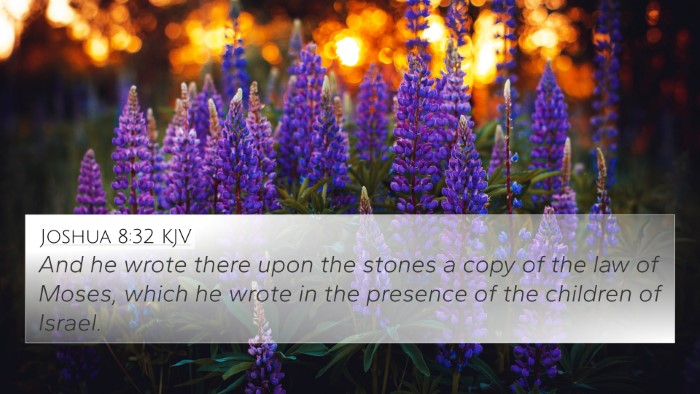Understanding Deuteronomy 27:3
Scripture Reference: "And you shall write on the stones all the words of this law very plainly." - Deuteronomy 27:3
Summary of Deuteronomy 27:3
Deuteronomy 27:3 is part of a larger passage where Moses instructs the Israelites on important commandments as they prepare to enter the Promised Land. This verse emphasizes the act of inscribing God’s law on stones, which symbolizes the permanence and clarity of His commandments. By writing the laws plainly, the Israelites are reminded of their covenant with God and the importance of His instructions for their communal and spiritual life.
Verse Meaning and Interpretation
This verse serves as a pivotal reminder of the necessity for clear communication of God’s laws. Scholars like Matthew Henry underscore that this act of writing the law on stones indicates a commitment to uphold the divine commandments perpetually. Albert Barnes points out the importance of making God’s laws visible and accessible to future generations, ensuring that they remain in the public consciousness. Adam Clarke emphasizes the clarity intended by the phrase "very plainly," indicating that these laws are to be understood without ambiguity.
Significance of Writing the Law
The act of writing serves several key purposes:
- Preservation: By inscribing the law on stones, the Israelites create a lasting record of God's commandments for posterity.
- Visibility: Placing the law in a public setting allows anyone who passes by to read and reflect upon God’s statutes.
- Reminder: It serves as a constant reminder to the Israelites to adhere to the laws of God throughout their journey.
- Commitment: The physical act of writing is a sign of their commitment to follow God’s words faithfully.
Bible Verse Cross-References
Deuteronomy 27:3 is interconnected with various other scriptures that enhance our understanding of its significance. Here are some key cross-references:
- Exodus 20:1-17: The Ten Commandments, serving as the foundation of the law.
- Deuteronomy 6:6-9: The importance of teaching God's commands to future generations.
- Joshua 8:32: Joshua fulfilling the command to write the words of the law on stones.
- Psalms 119:11: "I have hidden your word in my heart that I might not sin against you." The importance of internalizing God’s law.
- Romans 10:4: Christ as the fulfillment of the law, emphasizing the ongoing relevance of God's commandments.
- 2 Timothy 3:16-17: The role of Scripture in teaching, rebuking, correcting, and training in righteousness.
- Hebrews 8:10: God’s law written on the hearts of His people in the new covenant.
Thematic Bible Connections
Deuteronomy 27:3 connects thematically with the call for obedience to God’s law across both the Old and New Testaments. Understanding the connections between these verses can provide deeper insights:
- Old Testament Foundations: The groundwork laid in Exodus and Deuteronomy directly informs the teachings of the prophets and later New Testament writings.
- New Testament Affirmations: The teachings of Jesus and the Apostles reflect the essence of the laws inscribed in Deuteronomy.
- Covenant Relationship: The theme of God’s covenant is woven throughout the scriptures, demonstrating His desire for a committed relationship with His people.
How to Use Bible Cross-References
For those seeking to enrich their understanding of the Scriptures, employing tools for Bible cross-referencing can foster a deeper analysis of biblical texts:
- Bible Concordance: Essential for finding related verses and themes.
- Cross-Reference Bible Study: A systematic approach to exploring interconnected scripture passages.
- Bible Reference Resources: Utilizing comprehensive materials can aid in diving deeper into specific themes.
Cross-Referencing Biblical Texts
When exploring the Bible, consider the following methods for cross-referencing:
- Identify Central Themes: Look for thematic connections within the text.
- Explore Inter-Biblical Dialogues: Investigate how different books and writers address similar topics or laws.
- Comparative Bible Verse Analysis: Contrast and compare Old and New Testament teachings for a comprehensive understanding.
Conclusion
In summary, Deuteronomy 27:3 is not just an instruction but an enduring call to recognize, preserve, and live in accordance with God’s laws. Its significance is echoed through cross-referenced verses and has implications in both the ancient context and contemporary faith practices.















